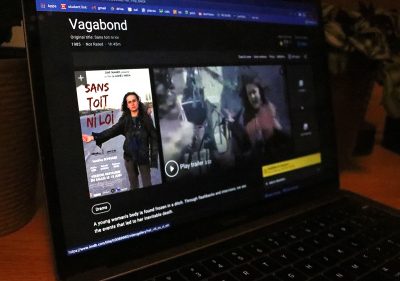I’m always intrigued by movies that start at the end but work their way through the story from the beginning. So much of the power that a regular narrative holds can come from withholding the protagonist’s fate until the end. Yet, this movie — one that revealed its ending at the beginning — still has viewers hooked.
The choice to begin a film with the character’s fate is especially interesting when it’s death. In “Vagabond,” we see our initially nameless protagonist dead in a ditch. Police officers survey the scene in the cold and barren landscape of rural France. They conclude the young lady had died from the cold and other natural causes.
“Vagabond,” directed by Agnès Varda and released in 1985, is so unique in the way that it mimics documentaries to create a narrative-style movie. After the police zip up the dead woman’s body, Varda begins to narrate the story as if the situation was a nonfiction event.

But she is not an all-knowing narrator. Instead, Varda attempts to work with the audience to piece together what happened before the protagonist’s death.
However, there is one thing that Varda does know — the woman’s real name. She reveals the protagonist’s name is Mona.
While the transcendent narrative style of this film is a highlight, there is no bigger standout than the acting performance of our soon-to-be deceased character. Sandrine Bonnaire was already a rising star in French cinema, having won the César Award for Most Promising Actress in 1984, but her performance as Mona Bergeron is an all-timer.
As the narrator goes through Mona’s past, it is revealed that the character creates a fake name for herself in an effort to get away from her boring office job. She meets many people — some good, some bad — but all of them for a limited amount of time.
Nobody really knows her well, and Mona seems to like it that way. While she’s quick to become friends with other people, those friendships quickly dissipate, often at the fault of her own actions. This is shown when a couple of goat herders take Mona in for the winter — providing her with food, shelter and company — Mona doesn’t help them out in return.
This leads to a lot of viewers finding our protagonist unlikeable as she’s cold and apathetic to those around her.
While I think Varda wants many viewers to feel that way about Mona’s character — choosing to use a documentary style to reinforce our position as an outsider to Mona’s life — Mona is really just a confused and unapologetic character whose actions diverge from the idealistic female protagonists portrayed in the media.
An official definition of the word “vagabond” is someone who goes from place to place without a home or occupation, and Mona certainly fits that description. But there is so much more to a person than where they live and how they earn money.
Mona is a vagabond in every aspect. She is described in a podcast as having, “No plans, no goals, no wishes, no wants,” and after meaningful relationships are formed, she is able to simply walk away to the next one with no expectation of what the next interaction will be.
This is the story of someone who chose to let themselves be openly vulnerable. She left the predictable life of being a cog-in-a-capitalist-machine for something else. Mona just doesn’t know what that something is. And when many people see a lady who isn’t currently serving someone or something, they call her crazy.
Leaving our current lives for the unpredictable is something everybody thinks about from time to time, and Varda was able to create a protagonist that is a reflection of what would happen if someone did decide to act upon this desire and leave everything behind. This is all a testament to Varda’s groundbreaking movies, many of which have won film awards.
“Vagabond” is one of many sensational films in the late Agnès Varda’s filmography, but none force the viewer to self-reflect on themselves and society as a whole more than this one.
It is available to stream on Kanopy using your BU Kerberos login information.






















































































































